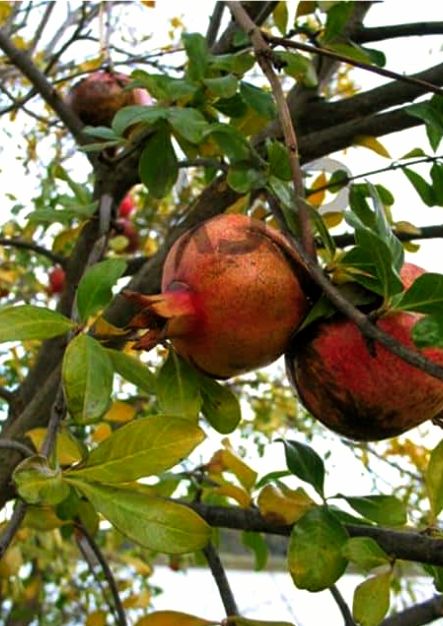Welcome to your holistic living

Botanical Name: Punica granatum Linn
Family: Punicaceae
English Name: Pomegranate
Malayalam Name: Matalam, Urumampalam
Hindi Name: Anar, Dhalim
Morphology : It is shrub or small tree about 5- 8 m. height, deciduous, glabrous, often with spinescent bracelets. Leaves- simple, opposite or sub opposite , often fascicled on short petioles. oblong or obovate. Flowers- globose, terminal or axillaries, solitary, large showy, scarlet or orange calyx coriaceous. persistent prolong above the ovary, free part companulate; ovary inferior. Fruits large globose, crowned by the somewhat tubular limb of the calyx. indetiscent, with a coriaceous rind; pulp red and juicy. sometimes white. Seeds- angular test a coriaceous (Flowers in April and fruits in June usually). Distribution & Habitat : All over India Chemical constituents :Ellagitannin, punicalagin, punicalin
Seed, fruit, root, bark, leaves, fruit covering
1. Antioxidant and Anti-inflammatory Properties:Pomegranates are rich in polyphenols like punicalagin and ellagic acid, which are powerful antioxidants that help reduce inflammation and oxidative stress in the body. 2. Cardiovascular Health: Studies show that pomegranate can help manage high blood pressure (hypertension) and improve blood flow, potentially contributing to heart health. 3. Anti-Cancer Effects: The bioactive compounds in pomegranate have been studied for their potential to inhibit the growth of various cancer cells, including breast cancer cells, and to suppress angiogenesis (the formation of new blood vessels that tumors need to grow). 4. Brain and Joint Health :Pomegranate's polyphenols, particularly ellagitannins, have been shown to have neuroprotective effects by reducing inflammation in the brain, which may help protect against neurodegenerative diseases like Alzheimer's and Parkinson's.The antioxidants in pomegranates may also help ease symptoms and prevent complications in people with rheumatoid arthritis. 5. Digestive Health :The fiber found in pomegranate seeds supports a healthy digestive system, which is crucial for protecting the gut microbiome and preventing chronic diseases.
1.Arsas- Ghee prepared with Dadima svarasa and Yavakara will check bleeding and pain (C.S.Ci.’4) 2. Puyameha - fruit rind of Dadima is made as infusion and administration with sugar orally.
Rasa: Kashaya, Madhura, Amla
Guna: Laghu, Snigdha
Virya: Usna
Vipaka: Madhura
Dosha Karma: Vatapitta shamaka